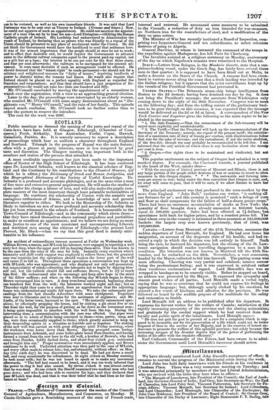SCOTLAND.
Public meetings to demand the opening of the ports and repeal of the Corn-laws have been held, at Glasgow, Edinburgh, (Chamber of Com- merce,) Perth, Kirkaldy, East Anstruther, Forfar, Cupar, Hawick, Galashiols, Peebles, &c. It is scarcely necessary to repeat a description of proceedings which bear so uniform a character throughout England and Scotland. Triumph in the progress of Repeal was the main feature; often with a glance at party interests, more or less tempered by good taste and discretion. The Glasgow meeting was important both in the numbers and station of the persons that attended it.
.A most creditable appointment has just been made to the important office of Rector of the High School of Edinburgh. It has been conferred upon Dr. Leonhard Schmitz, well known to the classical scholars of Eng- land and the Continent by his contributions to the Classical Museum, (of which he is editor,) the Dictionary of Greek and Roman Antiquities, and the Biographical Dictionary of the Society of Useful Knowledge. Dr. Sehroitz is a profound and accurate philologist, and at the same time a man of fine taste and extensive general acquirements. He willmake the studies of those under his charge a labour of love, and will also make the pupils com- plete masters of the most important though least palatable technicalities of language. He combines the scholarship of Carson with the amiable and contagious enthusiasm of Adams, and a knowledge of men and general literature superior to either. We look to the Rectorship of Dr. Schmitz as likely to introduce an mra of more profound and accurate scholarship than his yet'been witnessed in the schools of Scotland. It is honourable to the Town-Council of Edinburgh—and to the community which elects them— that they have raised themselves above national prejudices and partialities to make so excellent an appointment; and we believe we are doing no more than justice to one of the most consistent and uncompromising Liberals and worthiest men among the citizens of Edinburgh—the present Lord Provost, Mr. Black—when we say that this good deed is mainly attri- butable to his influence.
An accident of extraordinary interest occurred at Forfar on Wednesday week Whim Brown; a mason, and M-Leish his labourer, were engaged in repairing a well sixty feet deep, when the upper part fell in, burying them alive. This was known to lai-the case from the cries of the men for help. Instantly every exertion which humanity and skill could suggest was employed to relieve them; but the greatest care was requisite lest the operations should weaken the lower part of the well and cause it to fall in. Throughout these operations a conversation was kept up with hPLeish, who was uppermost; and who displayed not only self-possession, but magnanimity of mind,—directing the labourers not to begin by digging him- self mit, lest the rubbish should fall and suffocate Brown, but to try to reach hint first. He endeavoured also to encourage and keep alive hope in the mind of his fellow sufferer; and when on the following day M'Leish began to droop, Brown encouraged him in turn. A deep trenchwas commenced, beginning about one hundred feet from the well; the -labourers worked night and day; but on Thursday night they came to a stand, from an apprehension that the adjoining house was undermined and might fall upon them. We take the subsequent pro- ceedings from the last Dundee Advertiser with some abridgment. Expresses were sent to Glammis and to Dundee for the assistance of engineers; and Mr. Leslie, of the latter town, hastened to the spot. " He instantly commenced oper- ations, by effectually propping the house, and by sinking a pit about five or six feet from the well, for the purpose of getting as far down as the lowermost man; it being quite impossible to interfere with the well from the top. During the intervening time' a communication with the men was effected. Gas pipes were placed so as to admit of fluids being conveyed to them—wine, porter, soup, and tea, were thus occasionally supplied to them; which greatly assisted to keep up their desponding spirits in a situation so horrible and so hopeless. The sinking of the new well was carried on with great diligence until Friday morning, when the workmen were lower down than Brown. Having procured some morning, from Arbroath, and some boiler-plate boxes fiom Dundee, and having formed a tunnel from the new bore to the old well, a brother of Brown's, who had come from Dundee, boldly dashed down, and about fear o'clock p.m. extricated and brought him out." Proper restoratives were immediately applied, and Brown continues to do well. Undivided attention was then paid to the case of M`Leish, and every effort made to release him; brit, unfortunately, without effect: on Mon. day (the sixth day) he was discovered to be dead. He had got down a small bell, and rang occasionally for refreshment. At eight o'clock on Monday morning he took some milk; but he was not heard to speak or to make any movement afterwards. " The bell had ceased to be heard, and it was too truly inferred that the power to ring it had also ceased. By eleven o'clock it was almost certain that he was dead. At one o'clock the Sheriff examined two medical men who had gone down; and who had been able to examine his legs-' and they declared that
r M'Leish was dead, and that it was their belief that he had been so for three ars at least."


























 Previous page
Previous page